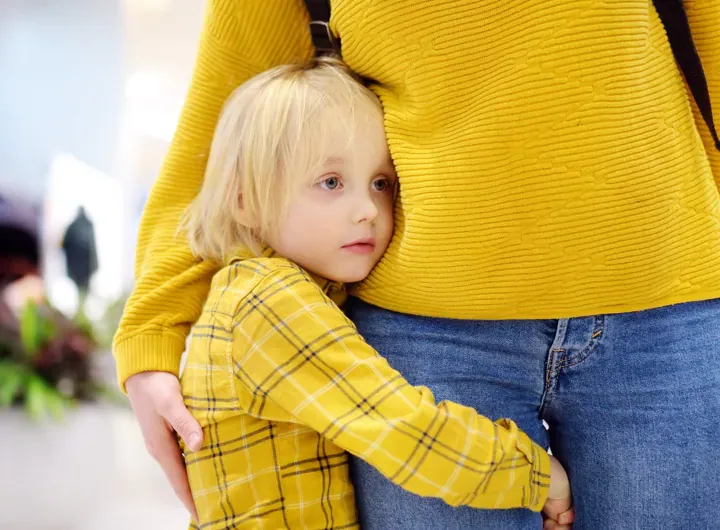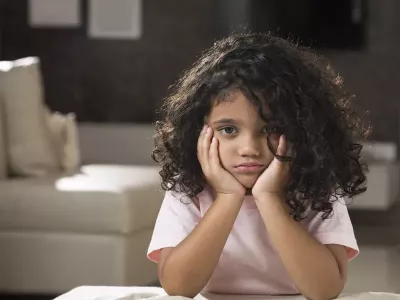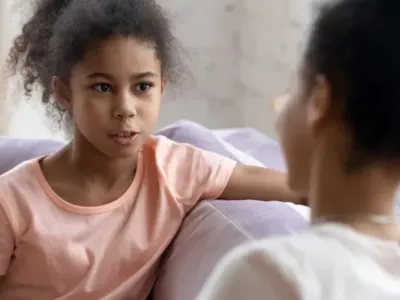How Can I Tell If My Child Is More Anxious Than Others?

If we didn't have any fear at all, ever, we'd disregard real risks like hot stoves and red lights, which would lead to a lot of physical injuries! But often, fears and anxious feelings that start out small can grow out of proportion. Or they can start to occur even when there's no actual danger. That's when anxiety can get in the way of everyday life.
When it comes to children and teenagers, how can you know what's a 'normal' level of anxiety – especially during a global pandemic – and what's starting to interfere with emotional wellbeing?
What's normal may depend on the reaction
Let's look at some imaginary examples:
- Emma is a 6-year-old who isn't very confident when it comes to heights. She's invited to a friend's party at the local playground where there is a high climber that Emma hasn't tried before. She tells her mother she's worried about falling and hurting herself.
- Lucas is an 8-year-old who used to enjoy birthday parties. However, now a sudden illness seems to pop up on the day of every social event. Without exactly saying "I'm worried", Lucas has started to frequently ask questions that seem to carry a lot of emotional intensity, and come out of the blue: "Do you think people like me? What if everyone laughs at me?"
So even though Emma has actually talked about being worried, her worries are more in line with what you might expect for a child of her age. Maybe she hasn't had much experience using climbing equipment, and, once she sees her friends climbing, she ends up giving it a try and building her confidence. This sort of occasional worry, which is common among kids of the same age, isn't really cause for immediate concern. But how you handle it can make a big difference.
Lucas, on the other hand, may not have literally said "I'm anxious" to his parents, but they can see that he's no longer doing something he used to enjoy, in a way that's different to other children his age. He's asking a lot of "what if…" questions and often imagining something terrible will happen.
Support your child’s or teenager’s anxiety coping skills with Fear-Less Triple P Online.
What happens next?
How a parent responds to either of these scenarios may depend on things like the parent's own experiences and their knowledge about how anxiety works (and let's face, we didn't learn that at school)! For example, if Emma's worry is reinforced by another adult, ("yes, that does look dangerous") and she doesn't get the chance to try climbing, it might make her more worried next time. If she'd had some extra stress in her life – like moving to a different school – and perhaps a natural tendency to be extra-cautious, it may be that her fear about climbing starts to spill over into other areas of her life.
For Lucas, anxious feelings seem to have already started to affect his wellbeing. These kinds of anxious feelings tend to increase, and parents may respond in two very understandable ways: sometimes being protective and reassuring, but sometimes losing patience and urging the child to just 'get over it'.
You might be surprised to learn that both of these ways of responding can increase a child's anxiety! A child's anxiety can really restrict what they are willing and able to do – they may not want to leave their parents' side, have trouble sleeping, panic about upcoming events or exams. They may have frequent headaches or stomach aches that seem more "worry sick" than "doctor sick". In some children, anxiety comes out as anger and behavioural issues, but not all the time. Sometimes, talking to a doctor or your child's teacher helps you get a sense of whether or not your child's anxiety is out of the ordinary.
Waiting and hoping anxiety will get better by itself?
Many parents/carers of anxious children or teenagers take quite a while to seek professional help. They often only do so after a long period of waiting and hoping the child will grow out of the problem, eventually realizing that things are getting worse. This, too, is very understandable and it's important to say it's never too early or too late to seek this kind of help.
Whether or not your child is obviously anxious, it's very helpful to learn more about how anxiety works, and effective ways to cope with anxious feelings, and other uncomfortable emotions (such as sadness or anger). You may want to help prevent problems in future, or you may want help to support your child or teenager now. There are many ways to help children develop useful ways of coping with anxious feelings, to help them become more confident and capable. Anxiety doesn't have to be something to worry about!

